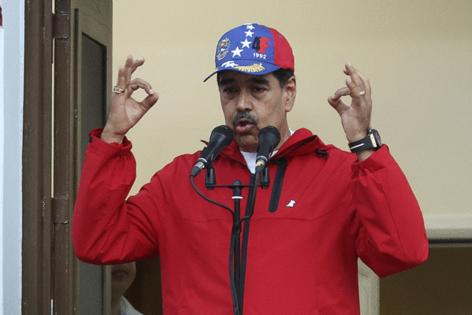As Venezuela's currency crashes, Maduro locks up analysts, shuts down dollar trackers
Published in News & Features
Failing to revive an economy in free fall, Nicolás Maduro’s regime has now turned its sights on those who dare to describe the collapse. In recent weeks, authorities have detained economists, analysts and digital platform operators who publish independent financial data, intensifying a campaign of repression aimed at concealing Venezuela’s worsening economic crisis.
In the latest chapter of the crackdown, at least eight people have been arrested, including former Finance Minister Rodrigo Cabezas, 68, who was taken into custody earlier this month in the city of Maracaibo. His whereabouts remain unknown.
Sources familiar with the detentions, who requested anonymity for fear of reprisals, said some detainees were released after a few hours. Others, however, remain in the custody of the Bolivarian National Intelligence Service, held without legal counsel or contact with their families.
The arrests followed the publication of alarming inflation data by the independent Venezuelan Finance Observatory, which reported an annualized inflation rate of 229% as of May. The Central Bank of Venezuela, controlled by Maduro loyalists, stopped releasing official inflation figures in October 2024, when prices began surging again.
“The government wants to eliminate the parallel market without supplying enough dollars — and that’s impossible,” said exiled economist José Guerra, who heads the observatory. “They’re trying to control inflation while printing money without backing. Monetary liquidity increased 250% through May alone. That inevitably fuels more inflation.”
The government’s sweeping effort to silence dissent has also extended to popular platforms like Monitor Dólar, which published unofficial exchange rates crucial for businesses and consumers in a country plagued by currency instability. The site stopped updating on May 27. Soon after, authorities detained around 20 people linked to the platform.
The cryptocurrency exchange El Dorado — often used as a benchmark for Monitor Dólar — also shut down operations in Venezuela following the arrests. Now, many informal currency exchanges are being routed through platforms like Binance, in an effort to avoid digital surveillance and government crackdowns.
With the cost in bolivars of buying a U.S. dollar increasing by more than 100% since January, the regime has responded not with economic reform, but with intimidation.
“The fierce repression began in June when they shut down websites publishing exchange rates and arrested 56 people, accusing them of trading dollars at unofficial rates,” Guerra said. “Then they arrested three well-known economists — including two from the National Academy of Economic Sciences and a university dean — and later detained two [observatory] associates, whose whereabouts remain unknown.”
Since Venezuela entered hyperinflation in 2017, the government has routinely withheld key economic data, including inflation, GDP, and balance of debt payments. A brief period of transparency ended last October, when inflation began rising again and a new information blackout took hold.
According to the observatory, Venezuela’s economy contracted 2.7% in the first quarter of 2025 — the first downturn in two years. The official exchange rate stood at 105 bolívars per U.S. dollar in May, while the parallel market rate surged to 139, widening the gap and inviting new speculative pressure.
Leading the charge is Diosdado Cabello, vice president of the ruling United Socialist Party of Venezuela, who has labeled economists raising the alarm as “enemies of the people.” On his weekly television program, he defended the arrests as part of a campaign against “economic sabotage.”
Analysts say the rhetoric aims to delegitimize any narrative that challenges the government’s version of events.
It’s an old chavista tactic: when they can’t control reality, they go after those who describe it, said a former high-ranking Venezuelan official.
In May, the U.S. allowed oil giant Chevron’s license to operate in Venezuela to expire — a significant blow to Maduro’s access to hard currency. The move came in response to his regime’s continued suppression of opposition candidates.
Compounding the economic pressure, the U.S. also imposed a 25% tariff on countries purchasing Venezuelan oil and gas, part of a broader effort to enforce sanctions on PDVSA, Venezuela’s state-owned oil company. The decision has already rattled global energy markets, with major buyers in China and India signaling plans to scale back purchases.
Facing dwindling foreign income and no access to credit markets, Maduro has resorted to printing money to finance state spending — a practice that economists say only deepens the crisis.
The chilling effect of the crackdown is already visible.
“No media outlet dares touch the economic issue. Neither radio nor television,” Guerra said. “Everyone fears being summoned by [the intelligence service] or detained. The government’s goal is clear: silence the one issue Venezuelans care about most — inflation and devaluation. It would rather jail those who sound the alarm than take steps to stop the collapse.”
In April, Maduro granted himself sweeping emergency powers aimed at consolidating control over the economy, citing the need to protect Venezuela from the escalating global trade conflict triggered by U.S. tariffs.
The decree authorizes temporary economic measures, including tax suspensions, centralized revenue collection and forced purchases of domestically produced goods. The government says the measures are intended to reduce reliance on imports and attract investment, though critics say they are unlikely to stabilize the economy or restore confidence.
Despite official reassurances, the currency markets are painting a different picture — one of accelerating collapse.
©2025 Miami Herald. Visit at miamiherald.com. Distributed by Tribune Content Agency, LLC.







Comments